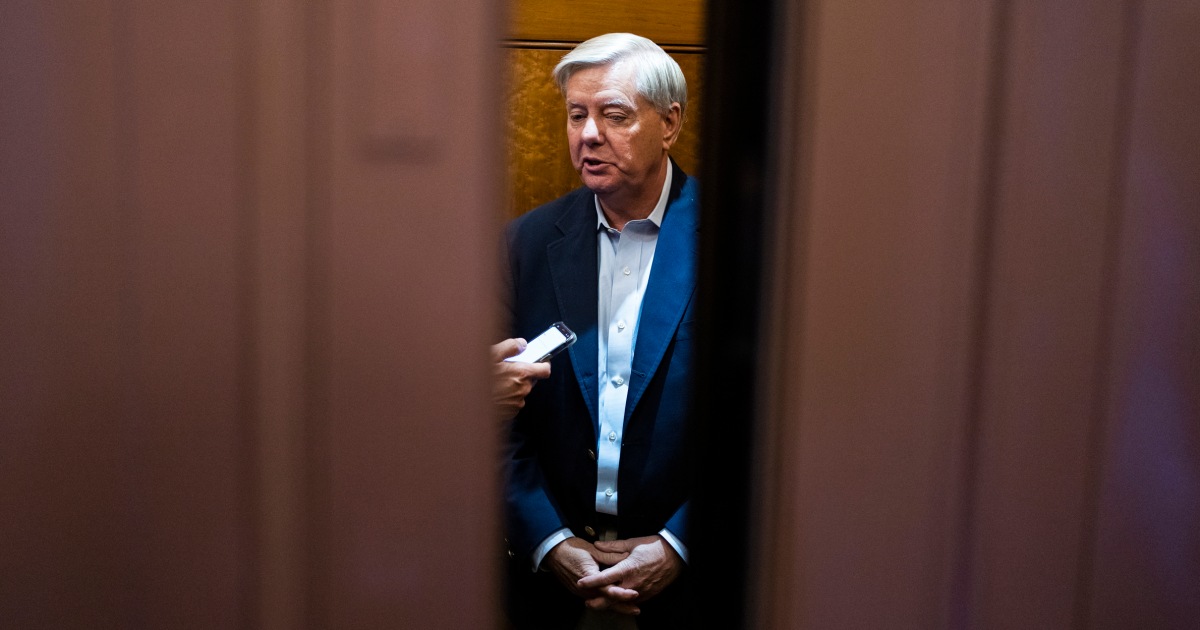WASHINGTON — The Supreme Court on Tuesday rejected a request from Sen. Lindsey Graham, R-S.C., to quash a grand jury subpoena in a Georgia prosecutor’s probe into alleged interference in the 2020 presidential election.
The decision is a victory for Fulton County District Attorney Fani Willis, whose office is investigating phone calls Graham made to Georgia election officials at a time when then-President Donald Trump was contesting the result. As a result of the court action, the subpoena can now be enforced, although Graham could refuse to answer questions by invoking his right against self-incrimination under the Constitution’s Fifth Amendment.
The decision means Graham could face questioning as soon as Nov. 17, according to his lawyer’s court filings.
On Oct. 20, the Atlanta-based 11th U.S. Circuit Court of Appeals rejected Graham’s attempt to avoid answering questions about phone calls he made to Georgia election officials after the 2020 election. Graham has argued that he made the calls as part of his duties leading up to Congress’ vote to certify the election results, and therefore the Fulton County special grand jury subpoena infringes upon the Constitution’s speech or debate clause, which protects lawmakers from investigations over comments they make in their official duties.
But the appeals court ruled the senator’s view of those constitutional protections was too broad and he should answer key questions from the grand jury, including whether he consulted with Trump’s campaign before making the calls.
The unsigned Supreme Court order said that the lower court already ruled that Graham cannot be questioned on his legislative activities. “Accordingly, a stay or injunction is not necessary to safeguard the senator’s speech or debate clause immunity,” the order said. The order also said Graham is free to litigate further over which issues are off-limits
Willis is investigating a pair of post-election phone calls Graham made to Secretary of State Brad Raffensperger and his staff. Raffensperger, a Republican, has said Graham pressed him about his power to reject certain absentee ballots, which he took as a suggestion to toss out legally cast votes. Graham has denied that was his intention, saying he was trying to understand the state’s process for verifying ballot signatures.
The grand jury subpoena said Graham “also made reference to allegations of widespread voter fraud” that was “consistent with public statements made by known affiliates of the Trump campaign.”
Lower courts had ruled that, in addition to the phone calls, Graham could be questioned on his public statements, any coordination with Trump’s campaign and any attempts to “cajole” election officials to take action.
Texas, joined by nine other conservative-leaning states, filed a brief backing Graham.
The senator’s lawyers argued that the court needs to step in or else his “constitutional immunities will be lost, and his statutorily guaranteed appeal mooted, the moment the local Georgia prosecutor questions him.”
As an influential member of the Senate Judiciary Committee, Graham helped ensure that Trump was able to make three appointments to the Supreme Court. His legal team is led by Don McGahn, Trump’s former White House counsel.
On Oct. 24, conservative Justice Clarence Thomas, who handles emergency applications that arise from Georgie, temporarily blocked the grand jury subpoena from being enforced while the court determined its next steps. The court often issues temporary “administrative” stays in cases involving emergency applications.
The Supreme Court is also weighing whether to block a House Jan. 6 committee subpoena seeking the phone records of Arizona Republican Party Chair Kelli Ward, who was one of the so-called alternate electors who falsely claimed that Trump had won the 2020 election in her state.
Share your story or advertise with us: Whatsapp: +2347068606071 Email: info@newspotng.com







 Seize Your Opportunity: Top 24 Scholarship Opportunities You Can’t Afford to Miss
Seize Your Opportunity: Top 24 Scholarship Opportunities You Can’t Afford to Miss 









